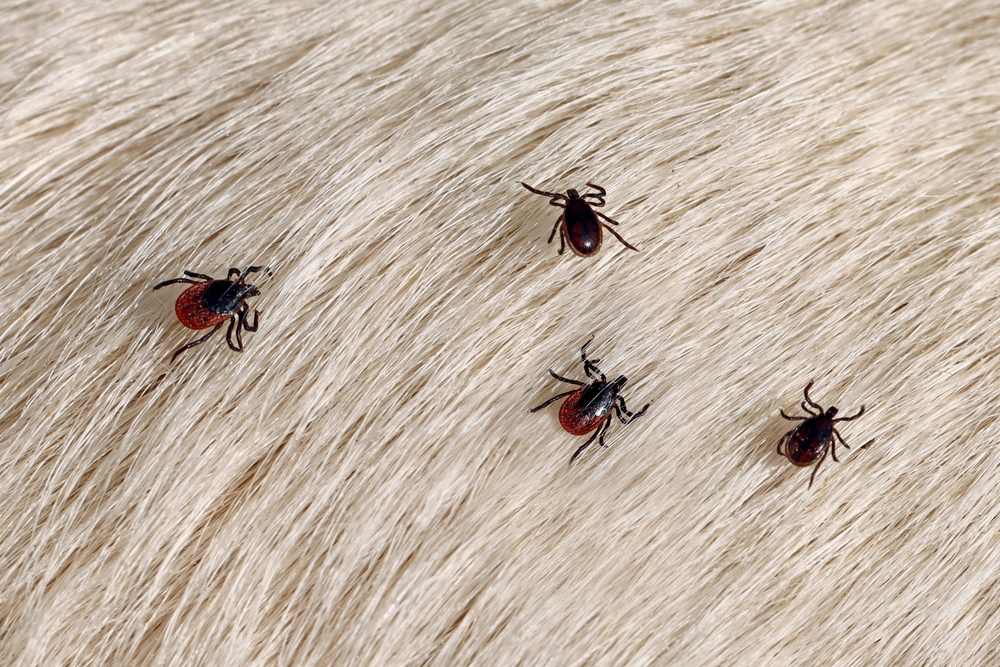Bug-Free and Thriving: How to Keep Your Pet Parasite-Proof
Finding parasites on your pet or in your home can make your skin crawl. Maybe you’ve seen small white worms in your kitten’s litter box, pulled a tick off your dog after a walk, or felt the sting of a flea bite while relaxing on your couch. Parasites are more than just creepy- they can cause serious illness, spread disease to people, and threaten your pet’s long-term health.
At Rustebakke Veterinary Service in Clarkston, we know that preventing and managing parasites is one of the most important parts of veterinary care. Our team combines compassionate, community-based service with gold-standard medicine, including in-house diagnostics, advanced imaging, and same-day urgent care when parasites or related illnesses can’t wait.
Because parasites affect nearly every part of the body, prevention is always safer and more effective than treatment. Here’s what every pet owner should know.
Why Year-Round Protection Matters
The importance of year-round parasite prevention cannot be overstated. Parasites don’t disappear in winter. Mosquitoes can survive indoors, fleas can live in your couch, ticks stay active in mild weather, and parasite eggs remain in the soil for years.
Even indoor pets are at risk. Fleas can hitchhike inside on shoes or clothing, and mosquitoes only need an open door to get in. That’s why our team emphasizes consistent, year-round protection during every wellness exam.
Fleas: Persistent Pests and Their Health Risks
Fleas reproduce quickly, and their life cycle- eggs, larvae, pupae, and adults- means infestations can take months to clear, even with treatment.
A growing problem is resistance. Many fleas are no longer controlled by older over-the-counter medications, which have been on store shelves for decades. Veterinary-prescribed preventives, offered through our preventative care services, are far more effective and reliable.
Fleas aren’t just itchy. They can transmit tapeworms, trigger flea allergy dermatitis in dogs and cats, spread bacteria, and in severe infestations, cause dangerous flea anemia, particularly in young or small pets.
Consistent flea prevention and environmental control at home are key to protecting both pets and people.
Intestinal Parasites in Pets
Intestinal parasites such as roundworms, hookworms, whipworms, and tapeworms are widespread in cats and dogs. Roundworms are especially common in puppies and kittens, often transmitted before birth or through nursing.
Signs may include vomiting, diarrhea, a bloated belly, or anemia. These parasites are zoonotic, meaning people can become infected too. To reduce risk, avoid walking barefoot in areas where pets defecate, and don’t allow pets to lick your face or mouth.
Another concern is giardia, a parasite that causes diarrhea and is notoriously difficult to eliminate. Pets can reinfect themselves through grooming, requiring multiple treatments and strict sanitation.
Routine fecal exams and targeted deworming, available through our diagnostic services, are the best defense.
Heartworm Disease
Heartworm disease is one of the most serious parasites affecting pets. Spread by mosquitoes, heartworms live in the heart, lungs, and blood vessels, eventually causing organ damage, heart failure, or death.
Symptoms often don’t appear until the disease is advanced. Coughing, weight loss, and fatigue are common warning signs. The Heartworm Prevalence Map shows that cases occur in every state, including the Northwest.
Treatment is risky, expensive, and not available for cats. Prevention with monthly medication is the safest option- and it’s part of every small animal care plan we provide.
Ticks and the Diseases They Spread
Ticks latch on quickly and can transmit illness within a day of biting.
- Lyme disease in dogs is one of the most well-known tick-borne illnesses, causing fever, swollen joints, lameness, and even kidney disease.
- Other tick-borne risks include anaplasmosis, ehrlichiosis, and Rocky Mountain spotted fever.
Our veterinarians can recommend the most effective tick control products during wellness exams based on your pet’s lifestyle and environment.
Mites and Mange in Pets
Mites in dogs and cats are microscopic parasites that can cause mange, ear infections, and skin irritation.
- Demodex mites cause patchy hair loss, often in young or immune-compromised pets.
- Sarcoptes mites cause scabies, a highly itchy, crusting skin disease that can spread to people.
- Ear mites create dark debris and discomfort, especially in cats.
At Rustebakke, our team uses diagnostic tools like skin scrapings and cytology to confirm infestations and develop targeted treatment plans.
Trematodes and Lung Flukes
Though less common, trematodes (flukes) can cause significant health issues in pets.
- In Washington and the Pacific Northwest, Salmon Poisoning can be caused from exposure to raw fish infected with Nanophyetus salmincola and Neorickettsia helminthoeca.
- Lung fluke infections in dogs and cats may cause coughing, pneumonia-like illness, or difficulty breathing.
Diagnosis often requires specialized testing, which our diagnostics team is equipped to provide.
Zoonotic Parasites: Protecting Families Too
Parasites don’t just affect pets. Many are zoonotic, meaning they can infect people as well. Zoonotic parasites such as roundworms, hookworms, and giardia are especially concerning for children and immunocompromised individuals.
To protect your household:
- Keep litter boxes and yards clean
- Wash hands regularly
- Avoid barefoot walking in contaminated areas
- Discourage pets from licking faces and mouths

How We Diagnose and Treat Parasites
Because many infestations are invisible in their early stages, veterinary diagnostics are essential. At Rustebakke, our diagnostic services include:
- Fecal testing for intestinal worms and giardia
- Bloodwork for systemic diseases like heartworm
- Skin and ear cytology for mites
- Imaging such as X-rays and ultrasound for organ-based parasites
Treating parasites isn’t always a “one and done” process. Many parasites have complex lifecycles, which means that a single dose of medication may only kill one stage, such as adults, while eggs and larvae survive. Multiple treatments, often spaced weeks apart, are required to fully clear infections and prevent recurrence.
Treatment may involve deworming medications, topical or oral flea and tick preventives, medicated shampoos, antibiotics for secondary infections, or specialized therapies for heartworm disease. In severe cases, hospitalization for IV fluids, blood transfusions, or intensive monitoring may be needed.
Our team is expertly trained to identify these conditions quickly and provide personalized treatment plans. Because treatment can be lengthy, stressful for pets, and costly for owners, prevention is the smartest investment. Year-round parasite control not only protects your pet’s health but also saves you the expense and worry of repeated treatments.
Protecting Your Pet From Parasites
Parasites are common, but they don’t have to compromise your pet’s health. With regular exams, consistent preventives, and fast access to care, your pet can live comfortably and parasite-free.
At Rustebakke Veterinary Service, we provide wraparound care that covers everything from wellness and preventative care to urgent treatment when parasites cause sudden illness. If your pet is showing signs of parasites or if it’s time to update prevention, we’re here to help.
Call us today at (509) 758-0955 or contact us online.
Need same-day care? Book Appointment or call ahead for urgent care so we can prepare for your pet’s arrival.









Leave A Comment